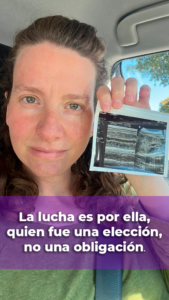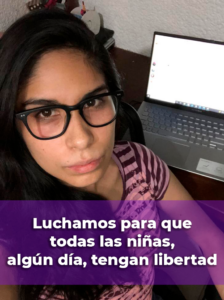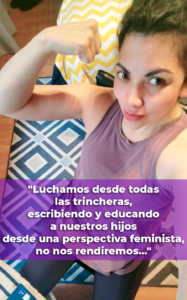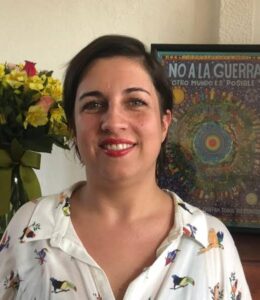Daily writing
Writing is not an easy task for anyone. It is an exercise of constancy, time and discipline. It is even less complicated for women and journalists, it goes without saying that it is not for lack of ability, but because of the load of pending tasks that chase us in our daily lives and that, when we finally find the space to sit down to write words, we are overwhelmed by fatigue and, sometimes, we give up at the end of the day.
Even so, we women have learned to pick up stones and find little holes to slip through.
When we manage to capture words on the keyboard, they imply an added vulnerability. One is completely naked to unveil one's soul to the audience and, in societies like ours, that already implies an act of true bravery.
It wasn't long ago that women used pseudonyms to publish under male or unisex names. J.K. Rowling herself, author of Harry Potter, desisted from publishing under Joanne at the suggestion of publishers in order to reach a young male audience. Rowling recently explained that she felt ?paranoid? about publishing under her name and not wanting to attract the attention of an ex-husband of hers. I don't know which disturbs me more, the fact that socially she was better accepted as a ?non-woman? or that she wanted to hide from a previous personal relationship.
And so we all go, overcoming the disadvantages -some more than others, of course- of a life made for the benefit of men. But we are lifting stones together, because as the great Francesca Gargallo, who left us a great legacy of struggle and alternatives to patriarchy, said: "Friendship among women is a revolutionary act and attitude".
Here is a sample in Peninsula 360 of what it means to write, to be a woman, to be a journalist and, for some, a migrant. Here we are writing daily in the revolutionary daily exercise of journalism, being women and being friends.

Woman, mother, daughter, writer and journalist
By Irma Gallo
Sometimes, when I feel that I lack words or that after a double or triple day (of work and care) I am too tired to sit down to write, I start thinking about all those who write in more precarious conditions than me, those who write in environments where they can barely breathe because of the different forms of violence that affect them in their daily lives.
I think that not all of us can have the room of our own that Virgina Woolf referred to in the middle beginning of the last century, that most of us write from that own room that the Spanish Itziar Ziga claims, and that in Mexico, as Dahlia de la Cerda says, it can be the dining room table where you are feeding your family, the public transportation where you go to work, the street where you place your street stall.
I write this thinking that from my privileges, but also from my disadvantages, I agree with others and then the road is less difficult.
The joke, I think, is knowing that we are together, knowing that to a greater or lesser degree, we all write from a disadvantage. But here we are, here we continue, dropping a few letters day by day.

Being a woman is an extreme sport
"Being a woman and a journalist is an extreme sport in Mexico," said a professor when I started my degree in Communication and Journalism, and the fact is that in this country an average of 10 women are murdered every day, in addition to the risk that the profession of journalism represents, in which, if you "meddle too much", denounce facts that stain the reputation of politicians, point out drug traffickers or know how organized crime works, you expose your integrity.
Combining these two categories, being a woman and a journalist, increases your chances of being murdered, but also if you add that one day you decided to go out at night, you wore a miniskirt or a cleavage, you did not moderate your drinking and you must also use public transportation to return home.
So, does it matter what profession you choose? I would say that the simple fact of being a woman is already an extreme sport, in which we have to "learn to risk as little as possible" without guaranteeing that even with "caution" we are safe, because they rape and kill the baby, the girl, the young woman, the old woman, the journalist, the doctor, the cashier, and anyone else!
Mexico's macho society condemns us to measure our decisions, analyze our actions, lose our personality and live in fear, fearing the Uber driver, our classmate, the teacher who makes "off-color" comments, the guy who asked us to dance, and even who we choose as our romantic partner.
We lose our privacy because we have to report to our trusted friend where we go, with whom we go, the clothes we wear, data that in case of disappearance will be exposed in all the media and with which we will be subjected to public judgment.
We experience all possible forms of violence, and yet we continue in the struggle, in the search for freedom and equality. Marching, writing or posting on social networks to make ourselves heard.

Letter to Elizabeth Jane Cochran, investigative journalism pioneer and reporter
By Pamela Cruz
Dear Nellie:
It has been 100 years since your departure. Every time I write, every time I research, every time I report, every time my mind slips through my fingers and pours onto a blank digital page, I think of you.
Letter by letter I think of the force that drove you to be, to see and to let others know the news from your unique perspective.
Thanks to your work I have come to understand that a woman with a pen is revolutionary, is punk, is insurgent, is visionary, is disruptive and is passion.
A woman who has decided to put on paper, on the web, in newspapers and on the radio, her voice, her thoughts, her research and her vision, is an emancipator, she is strength, she is color, she is inspiration.
Today there are millions of us in the world who follow in your footsteps: journalists, communicators, communicologists, reporters, conductors, editors, photographers and others, we realize that our passion for the truth and for knowing more goes beyond a simple profession.
If only today you could see what we have achieved. I imagine that being a pioneer in investigative journalism, the first female reporters and war correspondents back in the early 1900s was not an easy task, but we have fought. It has cost us thousands of lives of women who have not lowered their heads to give a voice to those who have not been able to.
The ink took on a crimson color when they tried to silence us, when those in power attacked us, confronted us and branded us as liars.
My dearest Nellie Bly, the battlefield has not been even. The hand of a patriarchy in the media has tried to contain us, has tried to silence us, has stained the pages of newspapers with the blood of women, but we are still here.
We have learned to do everything, from war journalism to narrating a soccer game. We are mothers, sisters, friends, wives, and yes, journalists.
Oh Nellie, "the lonely orphan", you were a feminist! How I wish you could see all those who have won the Pulitzer Prize. Yes, it is named after your former boss at the New York World.
I think back to your first job after arriving in New York, an article about a psychiatric asylum for women on Blackwell's Island, remember?
At the time you were called crazy for committing yourself to the asylum itself, exposing yourself to the same conditions to which the patients were subjected.
Your report is now a legend, "Ten days in a madhouse". What a way to give an account of the abuses of the administration over the patients, so much so, that it forced the health authorities to open an investigation and to take drastic measures on the treatment of the mentally ill.
Today we try to do the same. Millions of women follow in your footsteps, each one in different conditions, but always from the disadvantage of being a woman, because our work is still little recognized and violence against us does not cease.
I am saying goodbye, I have to make some notes, prepare a report, make dinner and help my son with his homework. I will write you soon, I think of you always.

Woman's voice
By Constanza Mazzotti
The walls of my house protect me from the memory of being a woman, that is to say, I know I am one of them because I learned to dress, I have long hair, I move and make up like one of them. I like my voice, I like my face and the way I decide the order of my day. My decisions are based solely on my personal desires. The complicated part comes when I decide to leave the house and my environment is dedicated second by second to point out that I am indeed a woman. The people who pass by me, the way they see me, the circumstances I face when I go out on the street reveal how dangerous the feminine becomes.
I have identified this feeling of being strange with my body as I pass through the streets since childhood, as well as the fact of being aware of this double way I have to express my femininity in an inside and outside the walls.
I thought that writing would be a neutral space. When I was a girl I used to sign my stories with a man's name so that the flash that would reflect my sex in the letters would confuse the reader, impressed by that masculine flash that signed each of the deliveries. Everything was going well until I naively delivered one of those texts with my own name revealing the secret of my voice. My secret was revealed, I could never again enjoy the privilege of having a male name. I became very fearful, filled with vulnerability as I began to sign my name. After thinking long and hard about the fears of publishing under a woman's name I realized how weak my voice and my positioning as a girl in the face of life was. Writing as a woman is difficult because the lyrics are also categorized as masculine and/or feminine. How to achieve that equality?
For more than five years I have maintained a space on the Internet where friends publish what we want to write, with no pretension of anything other than the pleasure of writing and, as if that were not enough, the slogan is to write about the intimate, the everyday and what for us is our own reality.

After all, fighting against oneself
By Mariel Zasso
Did you know that women often apply for a job opening only if they meet 100% of the requirements while men apply if they meet 60%? And what does that fact say about us women? That teaches another one of the daily struggles that we, and even more so the women we create, have to face. There is always a kind of lack of confidence that haunts even the most confident of us. Suddenly, as if out of nowhere, it comes and makes us question if we are really good, if we are really capable, if we deserve this job, if we should even be writing that book, that thesis, that opinion article. And it is good that one questions oneself, and always wants to improve oneself. But many times, that seismic self-confidence paralyzes us.
Yes, we trust in ourselves, we know we are capable, and we say so out loud. But there, buried in our unconscious since we were children, are narratives of perfectionism in which many of us get entangled, and which paralyze us. Because somehow, there is hidden there the idea that we should not dare. Or that if we dare, we have to show that we are perfect. Outstanding. And the truth is that men go around daring, applying to vacancies with much less qualification than us, writing whatever they want without fear. Because they, as children, were taught to dare. As for us, we were taught to be perfect. And preferably ?not uncomfortable?.
It seems that more and more of us are becoming aware of it and are questioning it. But like all struggles, it is a daily battle, and one cannot let one's guard down. Let's keep teaching our girls to be brave, daring, not perfect. And let's do the same with the little girl we were one day and still carry inside.

The new semantics of feminism
By Lourdes Durán
I decided to dedicate my professional life as a communicologist to teaching, although I began as a reporter in a media with an eminently social character: the Consumer Magazine.
These were hybrid years dedicated to the practice of the profession and the nobility of academia.
Married at a young age, motherhood came many years too late for medical reasons. And just as the joy of adopting a beautiful baby girl and giving birth to an extreme preemie came, my 15-year relationship ended.
The reasons are no longer important now. But at that time I had quit my jobs to devote myself to the most important thing: raising my two little almost-twins.
So, from one day to the next, the female condition of being a single mother, looking for a job and finding someone to help me with my 5-year-old daughters fell upon me.
I was confronted with the semantics of terms that were unknown in my generation: patriarchy, bullying, the pain of abuse and abandonment.
They were months of deep despair in the face of being a woman and a mother.
In the end, resilience, sisterhood (two new words for me) and the strength that we women and mothers draw from the deepest part of our guts to move forward.
My daughters, now 25, know in depth these terms full of the new feminine revolution we are living. Together the three of us have gone to the marches to try to build a new, much more just, feminine world.

Press release
The women of Peninsula 360 vindicate today, March 8, 2022, our right to exist as women, journalists, writers and friends. We take the floor to denounce the cowardly acts of femicide, of violence that women live not only in Mexico, but throughout Latin America and the world. We take the floor to raise our voices for those whose precariousness does not allow them to do so easily and we fight to create more spaces where each one speaks for herself. We speak out against the war, poverty and violence in Mexico that expels migrants wholesale and then makes them invisible? we use the pen to unveil the injustices and atrocities of the world, especially against other journalists, as in the case of Mexico.
Faced with the exacerbating toxic and sexist violence that affects men and women, that prolongs its effects on both sides of the borders, that poisons soccer games and deepens inequalities in the world, we women unite, once again, to say: Enough!
As women journalists, writers and communicators we resist collectively to build support networks among women and women's organizations, committed from feminist journalism to be an instrument of denunciation and expression in the face of gender violence, the injustices of the State against the most vulnerable population. Not one more, not one less! And if they touch one of us, we all respond.
You may be interested in: Francesca Gargallo, Latin American Feminist Legacy


